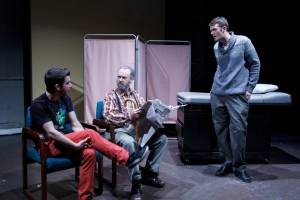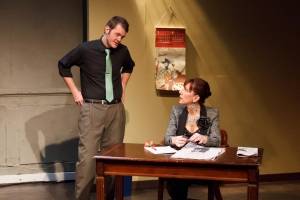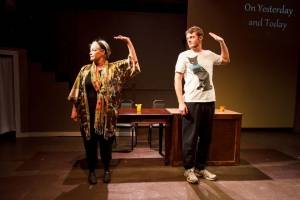
“All is well” is the mantra of the Douaihy family, who are the focus of Stephen Karam’s deeply moving and tragically funny play, Sons of the Prophet, playing at the Station Theatre. A 2012 Pulitzer Prize Finalist and winner of the New York Drama Critics’ Circle Award, Sons of the Prophet is a heartbreaking (yet somehow hilarious) look at human loss and pain, and our attempts to cope with our afflictions — whether they be physical or emotional.
The Douaihys are Lebanese-American descendants of Khalil Gibran, whose 1923 book The Prophet, a collection of inspirational poems, made Gibran the third best-selling poet of all time, after Shakespeare and Lao-Tzu. Karam’s marvelous piece deftly attacks tragedy with compassion, insight, and humor. The play uses Gibran’s aphoristic poetry as a framework — complete with projected scene titles taken from chapter titles of The Prophet (“On Work,” “On Pain,” “On Friendship,” etc.) — to explore the concept of enduring the unendurable.
 The play centers around brothers Joseph (played by Joel Higgins) and Charles (David M. Mor), who live in depressed Nazareth, Pennsylvania, with their ailing uncle, Bill (Matt Hester). We learn within the first few minutes of the play that the Douaihys have had their share of suffering, and early on, the family is dealt another hardship when Joseph and Charles’s father dies of a heart attack, potentially brought on by a high school prank gone awry. Understandably, Joseph has little patience for his slightly insensitive and chatty employer, Gloria (Chris Taber), who, learning of Joseph’s distant relation to the famed poet, thinks a memoir about the Douaihy family will return her to success in the publishing world.
The play centers around brothers Joseph (played by Joel Higgins) and Charles (David M. Mor), who live in depressed Nazareth, Pennsylvania, with their ailing uncle, Bill (Matt Hester). We learn within the first few minutes of the play that the Douaihys have had their share of suffering, and early on, the family is dealt another hardship when Joseph and Charles’s father dies of a heart attack, potentially brought on by a high school prank gone awry. Understandably, Joseph has little patience for his slightly insensitive and chatty employer, Gloria (Chris Taber), who, learning of Joseph’s distant relation to the famed poet, thinks a memoir about the Douaihy family will return her to success in the publishing world.
The triumph of this play is in its characters and their relationships to one another. Higgins, as Joseph, is the cornerstone of the performance. His subtle determination in the face of death, inexplicable chronic pain, and insurance issues, is beautifully believable, especially when that strength falters. Mor is the perfect counterpoint to Higgins’ Joseph; his sassy and smart Charles delivers many of the play’s laughs, even as his character faces the reality of one day losing all of the people in his life. Matt Hester, as the aging Uncle Bill, a devout Maronite dedicated to his family, effectively portrays a man much older than himself, who struggles with his own debilitation.
 The cast is rounded off with the previously mentioned Taber, whose Gloria is unknowingly inconsiderate, but also trying to help in her own way; Gregory Stewart, Jr., who plays Vin, the high school football player whose prank may or may not have caused the Douaihys’ father’s death; and David Kierski, as Timothy, the cynical journalist who thinks Gibran’s poetry is “exactly what a suffering world wants to hear.” Finally, Deb Richardson and Barbara Evans each portray various characters to hilarious effect.
The cast is rounded off with the previously mentioned Taber, whose Gloria is unknowingly inconsiderate, but also trying to help in her own way; Gregory Stewart, Jr., who plays Vin, the high school football player whose prank may or may not have caused the Douaihys’ father’s death; and David Kierski, as Timothy, the cynical journalist who thinks Gibran’s poetry is “exactly what a suffering world wants to hear.” Finally, Deb Richardson and Barbara Evans each portray various characters to hilarious effect.
Sons of the Prophet is impressively directed by Station veteran Gary Ambler, who has assembled a strong cast that navigates Karam’s tricky naturalistic dialogue (characters speak over each other, interruptions abound) with ease. The play also requires a large number of distinct locations — typically a challenge for the intimate Station — but Rachel Witt-Callahan’s scenic design delivers. Her clever use of space efficiently creates the various locales, including the old-fashioned Douaihy home (complete with multiple afghans), and transitions between scenes are smooth and efficient.
 Sons of the Prophet touches on several human issues, including family obligation, spirituality, and pain; but ultimately, it is Karam’s characters who make the play compelling. Gibran wrote, “Out of suffering have emerged the strongest souls; the most massive characters are seared with scars.” These characters are all broken, each in his or her own way, but perhaps it is their resolve and humor that makes the pain sufferable. Sons of the Prophet does not try to provide any easy answers to life’s struggles, and it leaves us wanting more. However, a glimmer of hope shines through with the play’s poignant final sequence, which hints that perhaps “all is well.”
Sons of the Prophet touches on several human issues, including family obligation, spirituality, and pain; but ultimately, it is Karam’s characters who make the play compelling. Gibran wrote, “Out of suffering have emerged the strongest souls; the most massive characters are seared with scars.” These characters are all broken, each in his or her own way, but perhaps it is their resolve and humor that makes the pain sufferable. Sons of the Prophet does not try to provide any easy answers to life’s struggles, and it leaves us wanting more. However, a glimmer of hope shines through with the play’s poignant final sequence, which hints that perhaps “all is well.”
Sons of the Prophet continues at the Station Theatre this week and next, closing on Saturday, March 9. All shows are at 8:00 p.m., and reservations can be made by calling (217) 384-4000 or visiting the Station’s website.
Photos by Jesse Folks. Poster by Barbara Evans.








